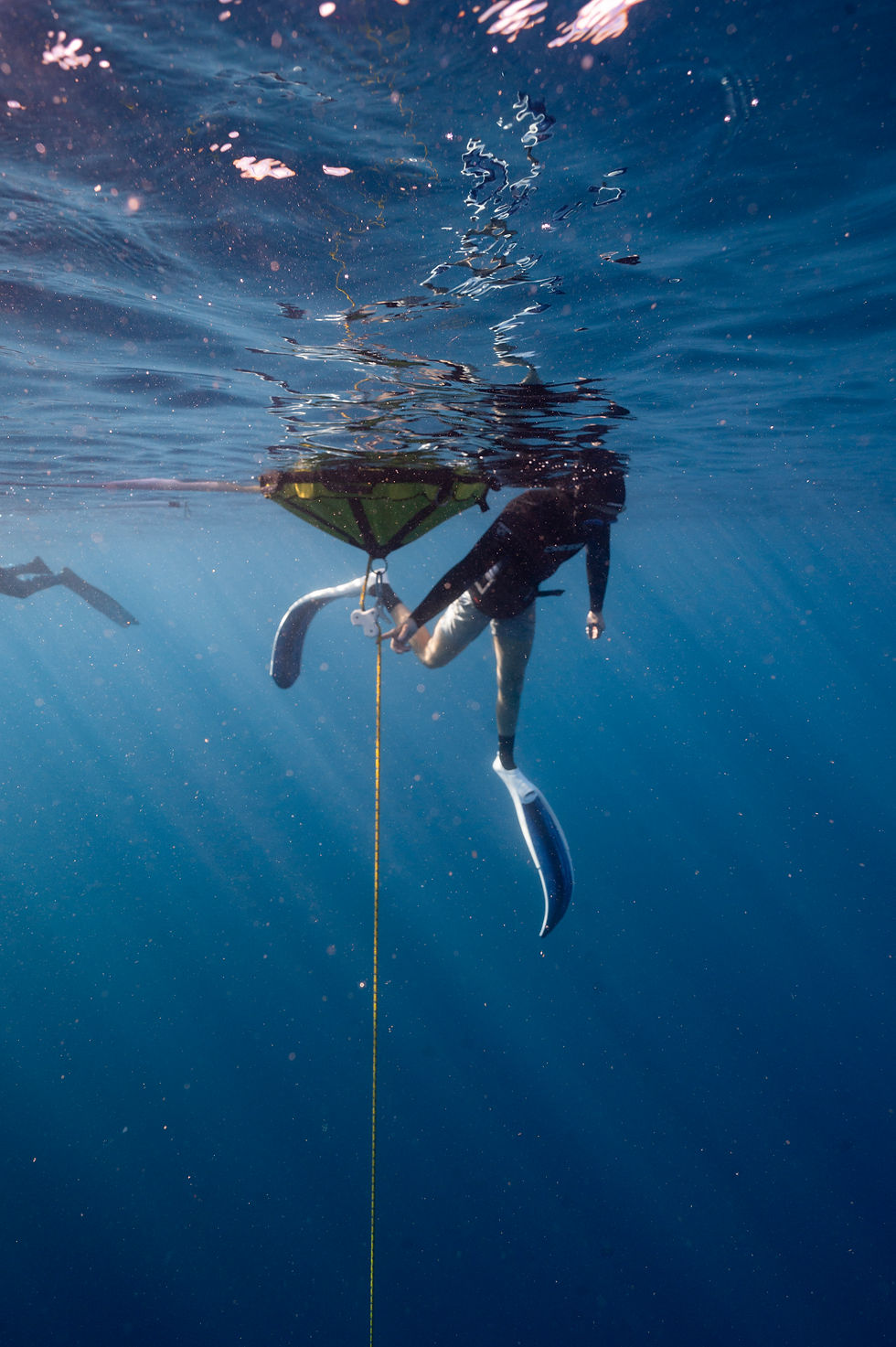Freediving for Women: Understanding Your Cycle and Optimising Performance
- Curtis Tredway

- Jun 5, 2025
- 4 min read
Updated: Jun 7, 2025
Foreword: At Deep Sensations Freediving, over 60% of our community are women—a stat we’re incredibly proud of.
This article is inspired by education into Womens performance in freediving, provided by Cassandra Cooper (UK and Canadian National Record Holder), Dommy from Apnea Art, and my own research (references below) and conversations with the incredible women I’ve had the privilege of diving with.

Freediving is one of the most intuitive and body-aware sports out there. It invites us to slow down, connect deeply with our physiology, and move in harmony with our internal rhythms. For women, that means learning to work with the menstrual cycle, rather than fighting against it.
Let’s unpack how female physiology affects freediving, how you can adapt your training and nutrition, and why understanding your cycle can actually enhance your performance underwater.
The Female vs. Male Hormone Cycle
Most training programs are built on a 24-hour cycle—based on male hormonal rhythms. But women operate on a roughly 28-day hormonal cycle, which has distinct phases that affect energy levels, mood, recovery, metabolism, and even breath-hold ability.
By syncing your freediving training and nutrition with your cycle, you can:
Maximise performance during peak windows
Prevent burnout and overtraining
Support your body during recovery phases
Increase self-awareness and confidence in your diving
Training with Your Cycle
Menstrual Phase (Days 1–6)
Your body is shedding the uterine lining and your hormones are at their lowest. Energy can be low, and iron stores drop due to blood loss.
Training Tips:
Focus on dry training like visualisation, light stretching, or breathwork.
If you do want to be in the water, keep it light and intuitive.
Prioritise rest and recovery.
Nutrition Support:
Focus on iron-rich foods (red meat, leafy greens, pumpkin seeds)
Pair with vitamin C (citrus fruits, capsicum) to aid absorption
Stay well hydrated and consider iron supplementation if needed
Follicular Phase (Days 7–13)
Estrogen levels begin to rise, leading to increased energy, motivation, and better recovery.
Training Tips:
This is a great time to ramp up your training.
Schedule deeper dives, CO2 tables, or more intense sessions.
Your body is primed for growth, adaptation, and performance gains.
Nutrition Support:
Flax seeds, tofu, chia seeds, salmon, and cacao are great choices
Maintain balanced meals to support energy and mood
Ovulation (Around Day 14)
Testosterone spikes briefly, often making women feel stronger, faster, and more confident.
Training Tips:
Great time for strong dives and PB attempts—but warm up thoroughly
Stay tuned in to any signs of strain or imbalance
Nutrition Support:
Foods like tuna, ricotta, eggs, lentils, and red meat are ideal
Focus on protein and mineral-rich meals to support peak performance
Luteal Phase (Days 15–28)
Progesterone rises, increasing metabolism and body temperature. This can reduce CO₂ tolerance and lead to earlier hypoxia. Many women feel more fatigued or emotionally sensitive here, as well as experience bloating (can gain up to 2kg, but don't worry it does go away).
Training Tips:
Prioritise recovery, technique, and relaxation-focused sessions
Use this time to refine skills or focus on dry breath-hold work
Be gentle with yourself if dives feel harder than usual - it’s hormonal, not a setback
Nutrition Support:
Prunes, seaweed, apricots, apples, and sweet potato help balance this phase
Magnesium and B vitamins may support mood and energy
Hydration is extra important - your body is running hotter
Menstruation and Diving: What to Know
A common question we get is whether it’s safe to dive during your period. The short answer: yes - as long as you feel good and comfortable.
Period product tips:
Menstrual Cups are popular among divers. They sit internally and are leak-proof even during deeper dives.
In the later days of your cycle, you might not need anything - many women find water pressure significantly reduces flow while submerged.
Important: Always rinse thoroughly after diving to reduce any risk of infection, especially when using internal products.
Final Thoughts: Know Your Flow, Know Your Power
Freediving encourages deep body awareness - and that includes your cycle. By listening to your body, adjusting your training accordingly, and supporting yourself with the right nutrition, you can stay consistent, reduce risk of injury, and feel empowered in the water.
Our retreats and courses create safe, supportive environments for women at all stages of their freediving journey. Our Wave 2 and our training focused Freediving Retreats include a workshop on "Overcoming Your Limits", which will now include insights into training with your cycle and understanding how female physiology affects performance.
Want more support on your freediving journey?Join us at Deep Sensations Freediving for inclusive, personalised courses, coaching, and retreats—designed to meet you wherever you are in your cycle, your training, and your confidence.
Trust your body. Respect your rhythm. Dive deeper.
UPCOMING RETREATS
ONLINE COACHING
References
Hackney, A. C. (2020). The Female Hormonal Cycle and Athletic Performance. Strength and Conditioning Journal, 42(6), 41–49.https://journals.lww.com/nsca-scj
Martin, D., Sale, C., & Cooper, S. B. (2018). Training the female athlete: A framework for menstrual cycle-related exercise programming. International Journal of Sports Physiology and Performance, 13(10), 1243–1248.https://doi.org/10.1123/ijspp.2018-0233
Harber, V. J. (2007). Menstrual Cycle: Implications on Exercise and Training. Canadian Sport for Life.https://sportforlife.ca
Reilly, T. (2000). The menstrual cycle and sport performance. Sports Medicine, 29(2), 73–78.https://doi.org/10.2165/00007256-200029020-00002
Cleveland Clinic. (2022). Nutrition and Exercise Throughout Your Menstrual Cycle.https://health.clevelandclinic.org/nutrition-and-exercise-throughout-your-menstrual-cycle
Healthline. (2022). Menstrual Cup Safety and Diving.https://www.healthline.com/health/menstrual-cup-dangers
National Institutes of Health (NIH). (2019). The Effects of Progesterone on Respiration.https://pubmed.ncbi.nlm.nih.gov/299386
British Journal of Sports Medicine. (2020). The female athlete: considerations for coaches and clinicians.https://bjsm.bmj.com
.png)



Comments